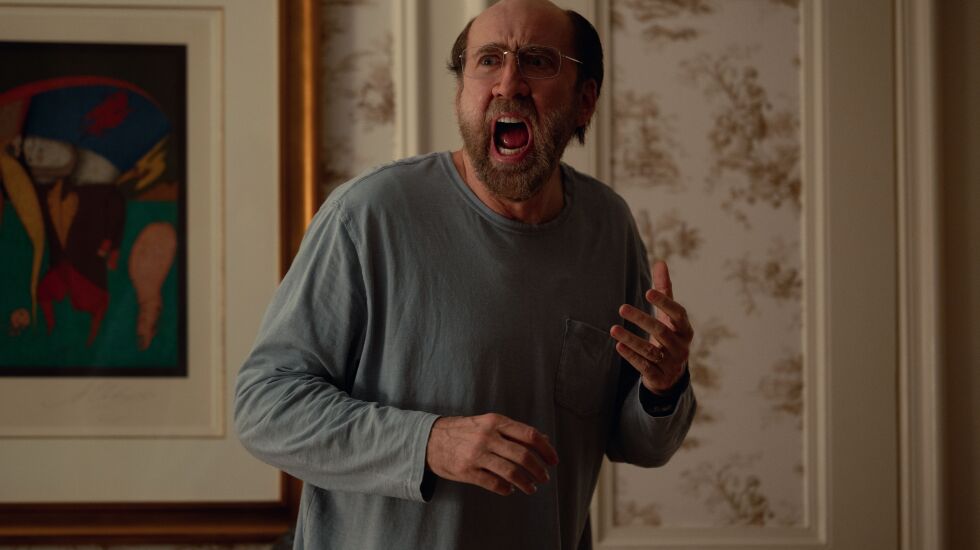
Meet Paul Matthews.
He’s so forgettable, you actually might have met him before, but maybe the moment didn’t stick in your memory. Paul is a bald, rumpled, uninteresting professor in oversized glasses who bores his students at a nondescript college with his lectures about how zebras don’t stand out due to their stripes; it’s quite the opposite, they keep their heads down to blend in with the herd. Just like Paul. He’s the kind of guy who never gets invited to the lively dinner parties held by his former college classmate and neighbor, the kind of guy who probably follows a few hundred “friends” on Facebook and is followed back by maybe 10 percent of the group.
Then, inexplicably, magically, mysteriously, WEIRDLY, Paul starts showing up in people’s dreams. Not just people who know him, but the hostess at the restaurant who looks at him quizzically, trying to figure out where she’s seen him before, and the ex-girlfriend who hasn’t thought of Paul in years, only for him to pop up into a deeply meaningful dream, and even some of his students. Suddenly, Paul is appearing in dozens, hundreds, thousands of dreams. What in the name of “Nightmare on Elm Street” meets “Adaptation” meets “Inception” meets “Being John Malkovich” meets “The Truman Show” is going on here?
Writer-director-editor Kristoffer Borgli’s “Dream Scenario” has one of the most ingenious setups of any movie of the 2020s and, even more remarkably, delivers on that premise for at least three-quarters of the story, before it falls just short of greatness in a final sequence of events that feels just slightly, slightly underwhelming. Still, with Nicolas Cage delivering a top 10 career performance as Paul, the production team creating a wintry, slightly fantasy-like atmosphere and Borgli pulling off the always difficult feat of creating sequences that approximate the ephemeral haze of the dreaming experience, this is a darkly funny, contemplative and at times heartbreakingly sad film.
We’re firmly planted in Paul’s unfashionably clunky shoes throughout the journey, and we feel his confusion when he first grasps what’s going on, quickly embraces his newfound celebrity, makes a series of bad decisions soon after — and then finds himself getting canceled for things he did in other people’s dreams.
The opening sequence of the film at first appears to be a real-life tableau, but we eventually learn it’s a dream of Paul’s daughter, Sophie (Lily Bird). Paul is benignly raking leaves in the backyard of the family home when a glass table suddenly shatters near his daughter. Objects begin to fall from the sky with alarming velocity. Sophie is eventually lifted into the air, screaming. All the while, Paul does nothing. He simply observes.
As it’s discovered Paul is appearing in the dreams of people everywhere, we learn that’s what Paul does — or should we say, doesn’t do — in every single dream. He’s a passive observer, an inexpressive bystander, no matter what kind of trauma, what kind of danger, what kind of trauma, the dreamer is experiencing in their subconscious night journeys. That eventually changes, with Paul becoming an active participant in many a dream, and not necessarily in a good way.
It’s not as if Paul is aware he’s inside all these dreams; it’s just … happening. There’s no attempt in the screenplay to explain this phenomenon, because how could you? The story is all about how Paul, and the people who find themselves dreaming about Paul, react to this bizarre development.
For a while, Paul is a rock star. He arrives to class and finds the lecture hall jam-packed. He gives TV interviews. He’s flown to New York for a meeting with an irritating hipster named Trent (Michael Cera) who runs an outside-the-box marketing firm called “Thoughts?” and pitches Paul on the idea of Paul becoming the world’s dream influencer, hawking Sprite. (Paul, ever clueless, wants to capitalize on his newfound fame to publish the academic book he’s been talking about for years — not that he’s ever written a word.)
It’s around this time that Paul suddenly becomes an active participant in many of the dreams, which leads to a hilarious and cringe-inducing real-world encounter with a marketing assistant at Thoughts? named Molly (Dylan Gelula), who wants to replicate the sexual encounters with Paul she has experienced in her dreams.
Dream Scenario Paul becomes a dark force. Students dreaming about him feel threatened by his real-world presence, though he’s done nothing to warrant that. Meanwhile, Paul’s once solid marriage to his loyal and supportive wife Janet (a wonderful Julianne Nicholson) begins to experience fissures. As Paul’s viral celebrity goes sideways and his life begins to unravel due to things over which he has absolutely no control, “Dream Scenario” expands into a larger commentary about how even our dreams can be co-opted and exploited, and we’ll leave it at that.
Poor Paul. The guy winds up yearning for the days when he was a human version of the zebra, keeping his head down and blending in with the herd, of zero interest to the predators of the world.







